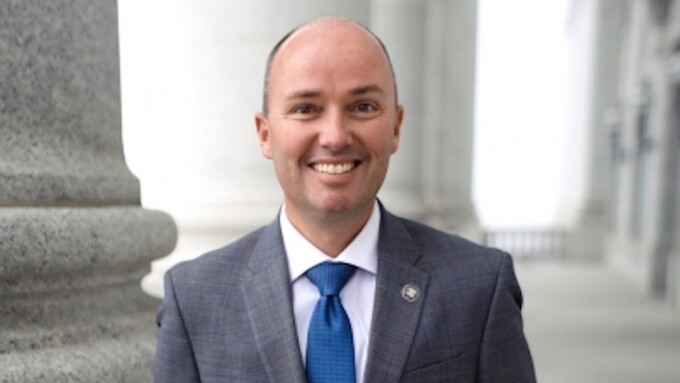SALT LAKE CITY — Utah governor Spencer J. Cox (R) signed yesterday the controversial bill, passed by the state legislature earlier this month, mandating a default “porn filter” on electronic devices sold in the state starting in 2022.
As XBIZ reported, the “porn filter” bill passed the State Senate on March 4 on a 19-6 vote (with four absences).
The bill had been introduced earlier this year as HB 72, sponsored by Rep. Susan Pulsipher (R-South Jordan) — a realtor with no technology experience — and was speedily passed by the House only hours after it had cleared the committee stage by the narrowest of margins (a 6-5 vote).
The bill was sponsored by staunch anti-porn crusader Sen. Wayne A. Harper.
Members of Utah trade associations, tech company lobbies and free speech groups all advocated against HB 72.
The bill, a version of which Pulsipher first had unsuccessfully tried to pass last year, only moved forward after it was amended to indicate that it “will not go into effect until five additional states have adopted similar language. It gives a 10-year period for that to occur," the Salt Lake City Fox affiliate reported in February.
An Invitation for Anti-Porn Activists
The amended version is what Gov. Cox signed into law yesterday, stating that the mandatory filters — from which for-profit, faith-based software companies have been profiting for some time — would have to be activated by default in 2022 if five more states pass copycat bills.
According to analysts, international manufacturers of phones and computers like Apple or Google could face civil liability if they don't comply.
Anti-porn groups are already at work introducing copycat bills in Republican-controlled states. Back in February, Pulsipher invited anti-porn advocates to support the bill at the committee stage, including an officer for NCOSE (formerly known as Morality in Media), the leading national sponsor and funder of anti-porn legislation.
The Parent State
Adult performer Cherie DeVille published an open letter to Governor Cox last week urging him not to sign the bill into law.
“If you want to monitor what your kid watches on their phone, install parental controls that have existed since AOL,” DeVille wrote. “If your kid still manages to watch porn, here’s an idea: Take away their phone. Why does any child need a cell phone anyway? They certainly don’t need the state to parent them.”
Governor Cox said the bill sends an “important message” about preventing children from accessing explicit online content, the AP reported yesterday.
The Utah governor also said “he isn’t as worried about constitutional concerns because the proposal won’t be immediately enacted,” according to the AP report.








